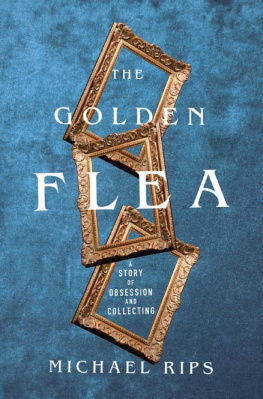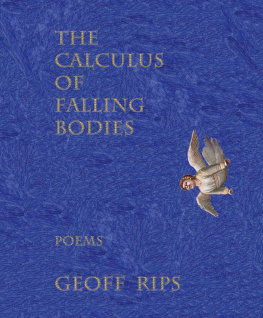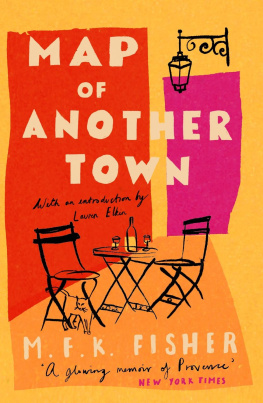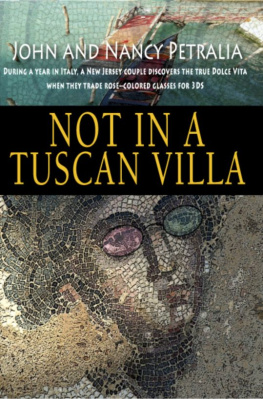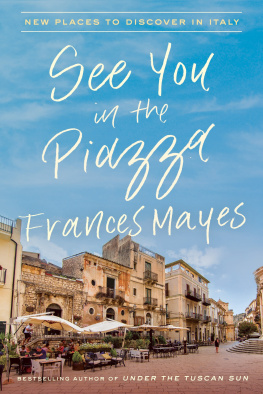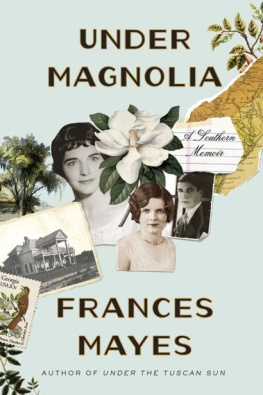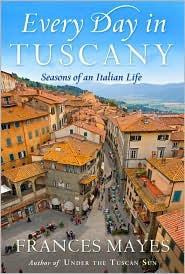Contents
About the Author
Born in Nebraska, Michael Rips practices criminal law in New York. He is married to the artist Sheila Berger, and he lives at the Chelsea Hotel in Manhattan.
Michael Rips
P ASQUALES N OSE
Adventures in a Small Town in Italy
This ebook is copyright material and must not be copied, reproduced, transferred, distributed, leased, licensed or publicly performed or used in any way except as specifically permitted in writing by the publishers, as allowed under the terms and conditions under which it was purchased or as strictly permitted by applicable copyright law. Any unauthorized distribution or use of this text may be a direct infringement of the authors and publishers rights and those responsible may be liable in law accordingly.
Version 1.0
Epub ISBN 9781473513099
www.randomhouse.co.uk
Published by Vintage 2002
2 4 6 8 10 9 7 5 3 1
Copyright Michael Rips 2001
Michael Rips has asserted his right under the Copyright, Designs and Patents Act 1988 to be identified as the author of this work
Certain names and details have been changed to protect the privacy of individuals
Illustrations by Rodica Prato
First published in Great Britain in 2001 by
Chatto & Windus
Vintage
Random House, 20 Vauxhall Bridge Road,
London SW1V 2SA
The Random House Group Limited Reg. No. 954009
www.randomhouse.co.uk
A CIP catalogue record for this book is available from the British Library
ISBN 9780099422730
for Sheila and Nicolaa
ACKNOWLEDGMENTS
For their contributions to this book I would like to thank Esther Allen, Kurt Andersen, Nicole Aragi, Judy Clain, Jill Connelly, Sarah Crichton, Romolo De Marchis, Luciano De Marco, Paolo Gnecco, Michael Gorchov, the Guidis, Romain Lamaze, Christina Odone, Joe ONeill, Harlan Rips, Claudio di Simone, and Michele Zalopany.
FOR AS LONG as I can remember I have suffered from the belief that the place where I am living, however wretched, is preferable to anywhere else, however pleasantthe brown grass here is better than the green grass there.
My brown grass that spring was the Riss Restaurant, a purgatorial place where I would sit day after day doing little or nothing, surrounded by others doing less. It was at the Riss that Sheila found me, at the Riss that she suggested that we move to Italy, and at the Riss that I refused to go.
Sheila, an artist, had just given birth to our child. With no reason to believe that I would ever work, she felt compelled to earn money. Thats where Italy came in.
Sheila knew of a medieval town at the top of a hill in central Italy. Artists lived there and one of them had a vacant house and studio. The town and studio would inspire her to complete a new series of paintings, which she would sell to support us. As for me, Sheila claimed that the town had two or three coffee shops that were as awful as the Riss.
I began to assemble the excuses for not going. But Sheila didnt need to hear themshe knew them from countless other conversations, all of which ended the same way: I would not leave.
But that afternoon something happened. A sheet of paper taped to the cash register. A sign.
The Riss, which had been open twenty-four hours a day, seven days a week, for seven decades, was closing.
It should not have surprised meunlike Heaven and Hell, Purgatory was bound by time, subject to decay and oblivion.
Days later we left for Italy.
That Sheila was responsible for the sign on the cash register did not occur to me until it was too late.
The Guidi
UPON ARRIVING IN Sutri, I made my way to the central square and found three cafs.
I chose the Guidi.
The plan was that Sheila would spend her days painting, while I would sit and reflect on the fact that Id not worked for years, had an infant daughter, and was unable to produce or even reflect on anything that I or anyone else would consider useful.
Sitting in the quiet of the piazza that first day, half an hour into my coffee, I felt the plan working. My thoughts, quite on their own, had ventured into matters of my life that Id long ignored.
There is no telling how far this would have taken me had I not noticed that the old men, who had been lined up opposite me against the wall on the south side of the piazza, were now standing, in exactly the same order, against the west wall. As the sun moved across the sky, the men followed the shade.
Waiting for the men to reach my tablethe break I needed from my self-reflectionI realized that we would have no way of communicating. According to Sheila, no one in the town spoke English, and I spoke no Italian.
Two hours later, I was surrounded. The men and I stared at each other for several minutes; then one of them askedin lightly scrambled Englishif I was interested in an Etrusco. I accepted.
The man entered the caf and quickly reappeared with two glasses of a luminous orange fluid. As we drank, I mentioned my surprise at his ability to speak English.
The old man explained that while others in the town spoke no English, those over eighty could carry on a conversation. As soldiers in World War II, they had been captured by the Allies and shipped to prisons in England or South Africa. During the day, the men were released into nearby villages, where they worked on farms or in factories, replacing the men who were at war. The Italians fell in love with the local women and learned to speak English.
These men told me their stories and became my friends.
I was an oddity in Sutrian American and a man of working age who also followed the shade around the square. The absence of tourists, American or otherwise, is endemic to the area.
The area, known popularly as Tuscia (the Romans referred to the Etruscans as Etrusci or Tusci), extends from Rome in the south to Tuscany in the north, the Tyrrhenian Sea in the west to Umbria in the east. The largest city in the region is Viterbo, with a population of approximately 60,000. Sutri is an equal distance between Viterbo and Rome.
The people of Tusciaquiet, unassuming, and suspicious of foreignersare not suited to the kind of self-promotion that is necessary to attract foreign tourists and that comes so easily to other regions in Italy. There is also the problem that the important antiquities in the region are Etruscan, a culture that remains largely impenetrable to scholars (the Etruscan language has yet to be translated), let alone the weekend tourist.
As a result, Tuscia is one of the great, yet neglected, areas in Italy. This despite the fact its beauty is equal to that of any region in Italymedieval towns perched on hilltops, volcanic lakes, abandoned beaches, and mountains forested with chestnut and oak trees.
It took me a month or two before I realized that the waiter and waitress at the Guidi Caff, a clean and welcoming pair, were Gino and Dina Guidi and that they owned not only the caf but also a good part of the rest of Sutri.
Despite their status, the Guidis spend their days serving coffee and pastries in the square. Dina, who is in her fifties, is one of the most refined women in the town. Elegantly dressed, she is in the caf at seven in the morning with her husband, her apron on, handing the people of the town, her friends, their first espresso. Every other day, she and Gino are replaced by Ginos brother, Enzo, and his wife, Nilla.
Next page

